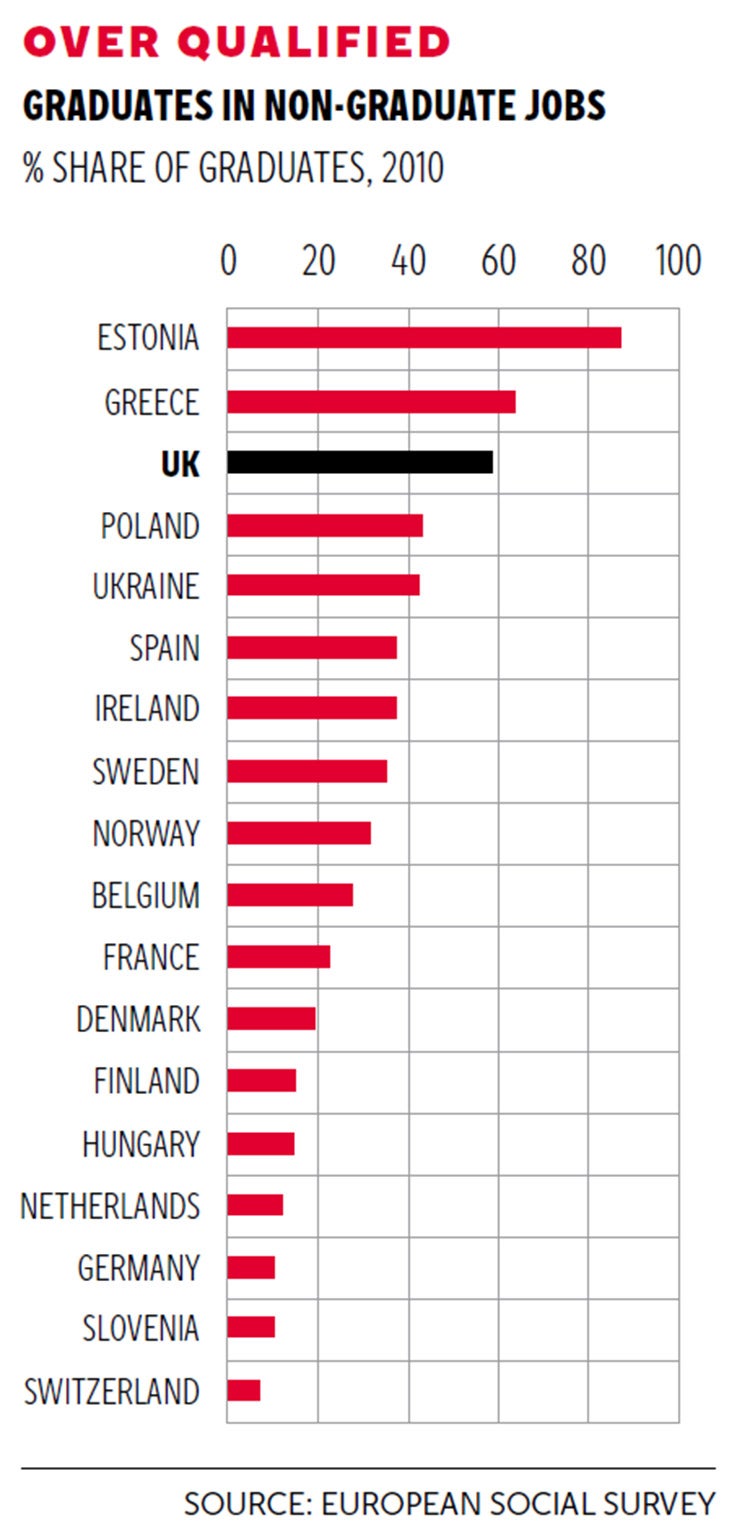Majority of UK graduates are being forced into non-graduate work, says study
More than half of UK graduates are now in non-graduate jobs - the highest in any European country except Greece

Your support helps us to tell the story
From reproductive rights to climate change to Big Tech, The Independent is on the ground when the story is developing. Whether it's investigating the financials of Elon Musk's pro-Trump PAC or producing our latest documentary, 'The A Word', which shines a light on the American women fighting for reproductive rights, we know how important it is to parse out the facts from the messaging.
At such a critical moment in US history, we need reporters on the ground. Your donation allows us to keep sending journalists to speak to both sides of the story.
The Independent is trusted by Americans across the entire political spectrum. And unlike many other quality news outlets, we choose not to lock Americans out of our reporting and analysis with paywalls. We believe quality journalism should be available to everyone, paid for by those who can afford it.
Your support makes all the difference.The majority of UK graduates are being forced into jobs which do not need their talents, according to a newly-published study.
Research for the CIPD (Chartered Institute of Personnel and Development), which represents human resource managers, shows 58.8 per cent of UK graduates have ended up in non-graduate jobs - a figure exceeded only by Greece and Estonia.
Around one in twelve of those working in low skilled occupations - such as in coffee shops, bars, call centres and front of house at hospitality events - are now graduates, according to the figures.
The research also shows that the UK has the second highest graduation ration amongst Western nations belonging to the OECD - behind Iceland. It shows it has a 54 per cent graduation rate. Germany, by contrast, has a rate of just 31 per cent.

It concludes the growth of graduates is “significantly outstripping the growth of high-skilled jobs generated by the labour market” in most OECD countries. However, it adds the trend is “particularly pronounced in the UK”.
“The assumption that we will transition to a more productive, higher value higher skilled economy by just increasing the conveyor belt of graduates is proven to be flawed,” said Peter Cheese, chief executive of the CIPD.
Instead, employers have started using degrees as a determinant when recruiting for what have traditionally been non-graduate jobs.
“Many graduates are simply replacing non-graduates in less demanding jobs or entering jobs where the demand for graduate skills is non-existent or falling,” says the report.
“This trend has particularly affected occupations where apprenticeships have been historically important such as construction and manufacturing.”
The report’s findings emerge as UK universities are about to enrol a record number of graduates this autumn following the Government’s decision to lift the cap on the number of students universities can recruit.

That, coupled with thousands of students aiming to beat the Government’s decision to axe maintenance grants from next September by forgoing gap years, means the number of recruits to universities is set to beat last year’s all-time high of half a million.
Figures published by UCAS, the university and colleges admissions service, showed 461, 120 had already been signed up for university courses this year - a three per cent rise on the same point last year. Of these, 34,000 had been accepted through the clearing system - a rise of six per cent on last year which was itself a record.
In addition, 5,020 of these were late applicants - meaning they could have decided to change their minds after Chancellor George Osborne’s budget decision to scrap maintenance grants.
The rise in student numbers will fuel concerns that growing numbers will be unable to repay their loans if growing numbers are recruited into lower paid jobs. At present, they only have to pay once they are earning £21,000 a year and the debt is written off after 30 years.
“This situation is unsustainable given that the Government estimates that 45 per cent of university graduates will not earn enough to repay their student loans,” said Mr Cheese. The figure is the estimate being worked on by the Government.
“Efforts need to be redoubled to ensure young people who are making choices after receiving their GCSE and A-level results can access good quality careers information, advice and guidance so they can make better informed decisions,” he added.
The report also coincides with further research published this morning showing a dire shortage of apprentices in the UK building industry with 66 per cent of small construction firms admitting they have been forced to turn down new business because they just do not have the employees to carry it out. Almost half have had to outsource work to other firms rather than leave it unfinished.
The research by the Federation of Master Builders blames pressure being put on teenagers to stay in full-time education and influence from teachers and family friends to pursue more academic goals.
The CIPD report, which is published the day before more than half a million teenagers received their GCSE results, calls on ministers to raise their efforts to increase the quality and quantity of apprenticeships to plug the skill shortage gaps. It urges employers to review recruitment practices to avoid using degrees as a screening process for jobs who do not require a university education.
Thursday is expected to see little change in the pass rate of 98.5 per cent and the 68.8 per cent getting five or more top grade A* to C grade passes last year. Exams regulator Ofqual has already indicated there will be a further drift in the numbers taking core academic subjects such as maths, English, the sciences, history and geography. The numbers taking modern foreign languages is expected to remain about the same.
A spokeswoman for the Department for Business, Innovation and Skills said: “We are providing the right mix of university places and apprenticeships to ensure more people have the opportunity to advance their careers and businesses get the skills they need to grow.
“Demands for higher education remains strong and graduates enjoy a pay premium that reflects their value to employers.”
Case study
Will Swarbrick, 21, enjoyed a distinguished academic career at the University of Warwick graduating in the summer of this year with a First Class history degree.

In spite of this academic success he, like many of his counterparts, has entered into employment in an entirely unrelated sector.
Will secured a job just after graduation in the technology sector.
He now works for the games development company Exient, based in Leamington Spa, where he confesses that he rarely uses his degree.
“Unfortunately other than very general, transferable skills my degree hasn’t really come into play in my current job,” he said.
“Although I enjoyed studying history, in reality its practical use is almost non-existent in my current role.”
No longer concerned with Marx and Foucault, Will now spends his days thinking about console, handheld and mobile game development.
Does he feel the degree provided good value for money?
“Not yet, but maybe at some point in the longer term.”
He does not regret his choice to study history but is now more mindful of the non-academic aspects of university education like extra-curricular activities and employer networking.
He wishes that his university had provided more hands-on, practical employment support and says that such support was insufficient while he was an undergraduate.
“The university tried their best with emails and occasional talks, but real-world experience could have been better.”
He suggests that universities could have built employability sessions into the curriculum from the beginning of the degree course and could have made access to employer information more readily available.
He advises future graduates to put more emphasis on part-time work and work experience to build a successful CV.
“I had a job while studying for my degree and I’m sure this has helped me secure my current employment.”
Harvey Day
Join our commenting forum
Join thought-provoking conversations, follow other Independent readers and see their replies
Comments